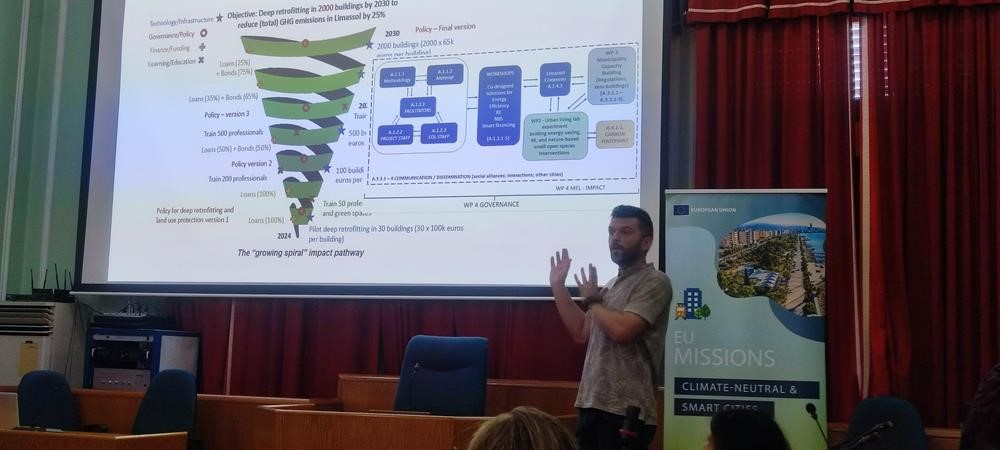On September, 21 and 22, 2023, the coordination meeting of the LC3 – Lemesos City Cooling Challenge, a project funded under the Horizon Europe program (2023 – 2026), was held at the Limassol Municipality.
Twenty-one project members from the Limassol Municipality (leader partner), The Cyprus Institute, the Cyprus University of Technology, the Cyprus Chamber of Science and Technology and Friends of the Earth, collaborated in participatory co-design solution workshops on fundamental aspects of the project. LC3 runs within CyI’s Energy, Environment & Water Research Center (EEWRC), and at the meeting Adjunct Prof. Thanasis Hadzilacos, Research Associate Vassilis Litskas (Climate Change Scientist), and Research Affiliate Krystallia Drystella (Communication & Human Systems specialist), RIMS Coordinator Dr Michael Papadopoulos, and Scientific Coordinator Rafael Stylianou, participated.
LC3 -Lemesos City Cooling Challenge project tests the systemic combination of innovative pathways, to accelerate decarbonization in a living lab environment. Distributed interventions at open spaces and buildings in Limassol city are planned during the project and beyond, scalable to all buildings and open spaces in buildings and transferable to southern, coastal, touristic and densely populated cities.
Overcoming attitudes and behaviors of apathy, helplessness, and myopic self-interest through broad stakeholder participation in co-design/creation solution workshops, is a main element of the project. Simple, collective, innovative and scalable interventions to reduce building energy consumption, mainly for cooling, that go beyond the technical aspects and involve citizens and stakeholders’ engagement plus capacity building (for the municipality) is another focus area. Reflexive learning pathways through the project, the city and local society support the implementation of the pilot activities and their upscaling, to achieve Zero GHG emissions in Limassol.
The project is science-guided (urban hit island as the main local problem; international center of excellence for emissions monitoring) and deploys smart, innovative solutions (Digital twin with GIS and remote sensing, AI for microclimate and lighting, bottom-up governance, and smart green financial Instruments). Based on known social obstacles it targets key identified city emissions domains (electricity for cooling).
The LC3 is participatory (co-design workshops and Limassol Commons in Governance), inclusive (multiple stakeholders: owners, professionals, scientists, civil society), and uses multiple levers of change (technology, finance, CoL capacity building, regulatory transformation, social alliance building) to set the foundations of a systemic change in a real-world living lab.
Limassol participates in the Mission for Net Zero (NZ) Cities by 2030. Accordingly, a Strategy has been developed and a Climate City Contract was submitted on September 15, including the 1) Commitments, 2) Action Plan and 3) Investments Plan. The transition to NZ involves the key thematics: Energy, Built Environment, Transportation, Coastal and Sea, Waste, Digital transition, that shape the city GHG emissions.
Source: The Cyprus Institute | News (https://shorturl.at/diAQU)
